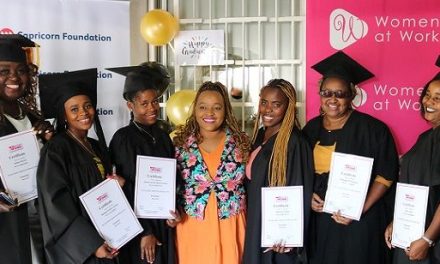
What gains for women in regional integration and trade agreements?

By Beatrice “Moda” Schultz – Future Females ambassador & Akoma Trading co-founder.
Walking under the sweltering sun, a heavy load upon her head and beads of sweat on her brow, Ndapandula makes the journey from the border to the nearest village where she will rest for the night before carrying on to Rundu.
Ndapandula is 25 years old, it’s been 3 years since she started selling vegetables from Angola in Namibia. She was informed of this trade by her cousin who was able to send her children to school with the money she made from a her cross-border trading. She had even been able to get her own place and was now able to employ other ladies to sell her wares at the market. Ndapandula was inspired to strive for the same financial independence.
Today was a good day, she made it easily through the border post. There wasn’t any haggling over her goods. She smiles as she thinks of how difficult things were in the past, of how the high tariffs for vegetables caused her to lose profits. She is grateful for the new laws, that regulate the tariffs so that they are not high for goods traded by women. Ndapandula is creating a future that she wants to live in with the opportunities that have now been afforded to her.
Alas, this is but a dream.
For as long as I can remember I have been surrounded by women doing business. My mother, a seamstress and fashion designer would make clothes for retail. She imported fabric and already made garments from Ghana to sell in Namibia. One of her biggest challenges was paying the import taxes when she brought in her goods. Whether it was vegetables being sold or jewellery, the women around me were always doing business for the benefit of their families.
Trade openness can increase women’s welfare. Evidence from the United States suggests that products specifically consumed by women face a higher tariff burden (Gailes et al. 2018). This higher burden is the result of higher applied tariffs and greater spending on imported goods by women consumers. In the textile sector, for instance, the tariff burden on women’s apparel was US$2.77 billion higher than on men’s clothing, and this gender gap grew about 11 percent in real terms between 2006 and 2016. As a result, tariff liberalization would lower the costs for women consumers and raise their welfare. A recent study for a sample of 54 developing countries suggests that eliminating import tariffs could result in a rise in real income for female-headed households relative to male-headed households in more than three-quarters of the countries considered. (IBRD, World Bank and WTO, 2020)
Better policies can help women overcome the challenges to trade and maximize the benefits. However, for women to benefit; policy makers need to actively address the challenges that trade itself can create while introducing complementary policies that enable women to fully participate in the economy. In a recent study undertaken by Trade Forward Southern Africa there have are barriers which specifically prevent women from exporting their goods. There are logistical, domestic & foreign administration, borders, financial risk, market knowledge, financing & cash flow, intellectual property and ownership of business issues that challenge women in particular. So although there is a growing awareness of the gender biases inherent in trade, there is still much to be done to level the playing field.
COVID-19 pandemic caused countrywide lockdowns, restricted movement of people as well as limited resources. Women in general were seriously adversely impacted economically especially in low-income countries (WTO, 2020). Sectors such as tourism and hospitality—in which women are particularly active as employers or employees—have been hit hard by international travel and trade restrictions imposed by countries to contain the pandemic. These sectors are also expected to experience a relatively slow recoveries because of lower consumer confidence and the likelihood of longer restrictions on international movement of people (UNWTO, 2020). Other sectors, including food services and handicrafts, that depend on tourism and employ a large share of women have also been hard hit.
The lockdown and social distancing measures have led to some companies to adopt or increase working-from-home in order to ensure continuity of their activities. A large number of women, however, simply cannot work from home, especially women working in sectors that require face-to face interactions like small scale manufacturing. Much lower information technology literacy rates and inadequate access to internet facilities; and a much higher burden of childcare, because of school closure, also prevent women from working from home. In addition, lower financial resources put the survival of women-owned businesses at greater risk.
New online platforms give women the opportunity to bypass these barriers and expand their entrepreneurial skills, as well as providing women with the flexibility that can help them manage work and other responsibilities. Digital platforms in both developed and developing economies have witnessed a sharp rise in women-owned companies, in particular micro and small enterprises over the years. During the lockdown last year Future Females was able to host two online accelerator programs in collaboration with Start-Up Namibia to assist women in putting their businesses on digital platforms and giving them the much-needed support to overcome educational and financial barriers.
The dream of Ndapandula being able to trade easily and effectively is still a way off, however as we work together through beneficial collaborations, we are able to equip, empower and support women. As the saying goes: “If you want to go fast, you go alone but if you want to go far, you go together.” Therefore, EVERYONE is needed to join in the conversation; we need men to use their spaces and networks to make them more inclusive and we need all businesses to be gender sensitive in their operations as well as recruitments into senior management. Organisations such as Future Females could give skills trainings through our business school program and our founders institute which gives day to day support of running a business. Last but certainly not least, we need government to develop more gender inclusive policies at borders.
Some Important Facts!
How is gender equality measured?
There are many ways to measure gender inequality, including employment, wages, health, and education. Some measures seek to combine different aspects of gender inequality into an overall assessment of how women fare compared to men. Such tools include the United Nations Development Programme’s Gender Inequality Index and the World Bank’s Women, Business and the Law. Although this report refers to both indexes, its analysis focuses on specific aspects of inequality that are directly affected by trade, such as the wage gap, the employment gap, and the productivity gap. It also addresses aspects of gender inequality, such as education and societal discrimination against women, that occur outside of the workplace and that can affect the extent to which women can benefit from trade. (WTO, 2020)
Why is gender equality important?
The renowned life-long African educator, James E. Kwegyir Aggrey said it best: “If you educate a man, you educate the individual but when you educate a woman you educate the nation”. Women and girls account for half the world’s population and therefore represent half of its potential.
Gender equality is central to all areas of a healthy society, from reducing poverty to promoting health, education, welfare, and well-being of girls and boys. Reducing the gender gap promotes economic development. Societies are unable to unlock their potential and meet the challenges of rapid economic and technological change without harnessing the skills and ideas of their entire population. Achieving gender equality and empowering all women and girls is the fifth Sustainable Development Goal of the United Nations’ 2030 Agenda for Sustainable Development (WTO, 2020).
This insightful article was first published in Trade Talk Tuesday on 11 May 2021 by the Namibia Trade Forum. Republished with permission of the author – Ed.












































